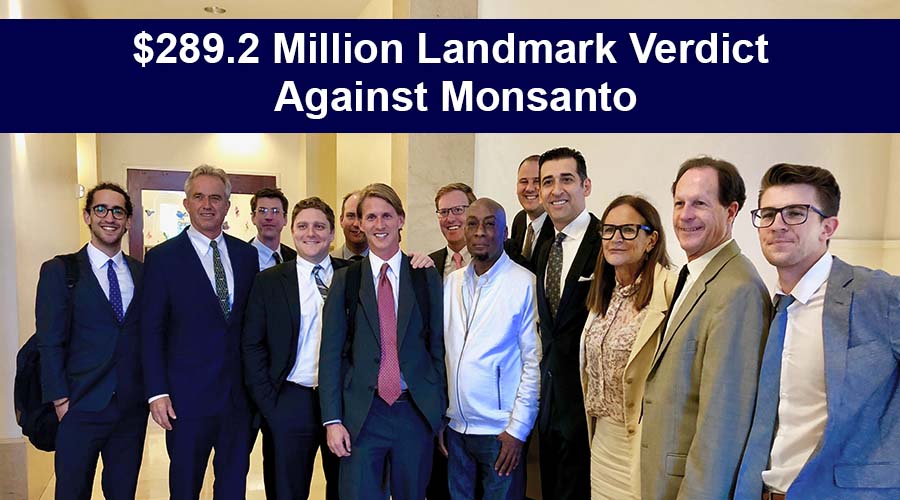In a stunning decision, a jury recently found that Monsanto’s glyphosate herbicide, Roundup, contributed to a school groundskeeper’s non-Hodgkin lymphoma.
The jury awarded Dewayne “Lee” Johnson’s $39.3 million in compensatory damages and an additional $250 million in punitive damages, ruling that Monsanto acted “with malice or oppression.” The verdict was reached in the first personal liability lawsuit against Monsanto over Roundup’s role in causing non-Hodgkin lymphoma.
“Very significant ruling”
The court decision was a massive blow to Monsanto, which has claimed that its glyphosate-based Roundup herbicide was safe. But the jury wasn’t convinced as evidenced by their verdict against the company.
“It’s a very significant ruling,” said Charles Benbrook, visiting scholar at the Bloomberg School of Public Health, Johns Hopkins University, and an expert for Johnson’s attorneys. “The judgment of the jury was that the preponderance of the evidence supported the fact that Lee Johnson’s use and exposure to Roundup herbicide contributed to his cancer. And they also concluded that Monsanto failed to warn users about the potential cancer risk. The fact that Monsanto has so egregiously overstated the evidence suggesting that Roundup is essentially non-toxic weighed heavily on the minds of the jurors.”
Co-lead trial counsel Brent Wisner said the verdict was a result of newly revealed confidential Monsanto documents.
“We were finally able to show the jury the secret, internal Monsanto documents proving that Monsanto has known for decades that glyphosate and specifically Roundup could cause cancer. We are proud that an independent jury followed the evidence and used its voice to send a message to Monsanto that its years of deception regarding Roundup are over, and that they should put consumer safety first over profits.”
The internal documents revealed, among other things, that a scientific advisor hired by Monsanto told the company that past testing for Roundup was insufficient because glyphosate, the active ingredient in Roundup, was tested in isolation without the other chemical ingredients that make up the Roundup formulation.
Johnson, who worked as a groundskeeper for a school district in Benicia, California, argued that his use of and exposure to Roundup caused his cancer. He may have only a few months to live, according to his doctors.
Johnson, a father of three, told the jury that Monsanto should have not let him spray the herbicide near schoolchildren. “I never would’ve sprayed that product on school grounds or around people if I knew it would cause them harm.”
Many more Monsanto documents will be presented in future cases
Monsanto, which was purchased by Bayer this year, said it would appeal the decision. Company vice president Scott Partridge said he was confident his company would win an appeal.
Bayer, which now must deal with Monsanto’s legal troubles, released a statement saying: “Bayer believes that the jury’s decision is at odds with the weight of scientific evidence, decades of real world experience and the conclusions of regulators around the world that all confirm glyphosate is safe and does not cause non-Hodgkin lymphoma.”
Benbrook called Monsanto’s confidence in winning an appeal “wishful thinking” because the jury only saw a “fraction of the evidence in the records pointing to the systematic effort made by Monsanto to mislead the EPA and other regulators about the risk of glyphosate-based herbicides.”
Many more internal Monsanto documents will be presented in future lawsuits going forward, says Benbrook. “I think the Monsanto legal team faces a very steep hurdle in finding a way to explain away the clear evidence from internal Monsanto emails that shows that the company was not straight with the EPA, about what it knew and about the risk of its products. In most of the other venues that these future trials are going to happen in, it’s almost certain that a much bigger portion, if not most of the more damning evidence, is going to be allowed to be presented to the juries.”
Benbrook says there are an astounding seven million documents, the majority of them internal Monsanto documents including communications between the company and its public relations firms, hired scientists, and professional organizations.
“They had one objective—to get as many registrations and labels for Roundup herbicides as possible, covering the most crops, and the greatest array of uses. And then defend them to the last man standing… This is why it is still common to see Monsanto spokespeople say that there is no evidence that glyphosate poses any risk. Really? What about the few thousand studies out there that show that it does?”
In 2015, the International Agency for Research on Cancer, an agency of the World Health Organization, concluded that glyphosate is “probably carcinogenic.” Since then, there has been a concerted effort by Monsanto to discredit those findings.
Bayer can’t pay $289 million to 8,000 people
There are about 8,000 more plaintiffs with similar claims against Monsanto. Another trial is scheduled to begin in October with at least six more in 2019.
News of the Johnson ruling and another ruling by the California Supreme Court refusing Monsanto’s appeal to keep Roundup off a list of carcinogenic chemicals in the state sent Bayer’s stock tumbling by 18 percent.
Benbrook says Bayer has difficult decisions to make and may have to settle cases. “The conundrum that Bayer faces now is that there are a lot of cases, and clearly not even Bayer can pay $289 million to 8,000 people that allege that their non-Hodgkin lymphoma was associated with the use of Roundup herbicides. So, something has got to happen here.”
Benbrook says Bayer should change the labels on Roundup products to include warnings of cancer and other health risks, something Monsanto never did.
“If Monsanto had done that 20 years ago, and had also complied with EPA’s 1986 request to put additional worker-safety provisions on Roundup labels, there probably wouldn’t be this litigation today, and there would likely be fewer people with non-Hodgkin lymphoma.”
(Additional sources: The Guardian, AgriPulse)





